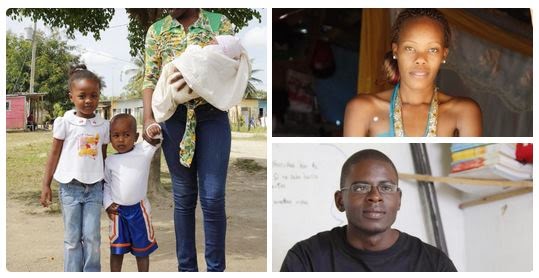Wonder what our work is about? What can ''advocacy'' look like? Well often times it looks like contributing to an ongoing campaign that others have already started. Ted and I are involved in our own efforts with
MCC, ones that are growing from the ground up such as our work with
housing. However, it is a crucial part of our work to share about specific, tangible advocacy opportunities as they arise, with those near and far.
We know that many care deeply for Haiti and so would jump at a small opportunity to make a change, yes?
One such issue and opportunity is presented here, and it regards
illegal deportations of Dominicans of Haitian descent, one further page in the disastrous story of recent prejudicial rulings by Dominican courts. We hope you will take 5 minutes to take part in advocacy to ameliorate the suffering caused by recent illegal activity.
Background
In September 2013, the Dominican Constitutional Court ruled that all children born of parents with illegal status between 1929 - 2010 can no longer claim Dominican nationality. This decision stripped at least 200,000 Dominicans of Haitian descent of any right to citizenship (
Washington Post).
As stated in the Post, "The court’s decision enshrines the deep-seated racism and discrimination suffered by Haitian migrants and their children, who have worked back-breaking jobs in Dominican sugar-cane fields and construction sites for many years. It leaves the migrants stateless, lacking even the certainty that their children can receive an education."
Due to significant international pressure, including that from the Inter-American Court of Human Rights, the Dominican government created a pathway for those affected to register to obtain a residence permit, but as a recent report from
Amnesty International points out, "Just a tiny percentage of those eligible to register under the law have been able to start the process before time ran out." The deadline for this application period ended on February 1st, and has not been extended.
 |
| "The faces of statelessness in the DR. " For more follow @RobinGuittard of Amnesty Caribbean |
Even before this deadline, the Dominican Republic has started deporting people without due process.
One such illegal mass deportation of 51 people took place on January 27th.
According to Amnesty, 30 in this group were Dominican-born children, others included some of their mothers
and 14 other adults. They say "more mass deportations of Dominicans of Haitian descent and Haitian
migrants are feared."
Read Amnesty's full report here:
http://www.amnestyusa.org/sites/default/files/uaa02015.pdf
Take Action
So what to do in light of this grave issue? In response to Amnesty's call, you can
e-mail Dominican officials urging them to protect these recent deportees and to stop all illegal deportations. Address letters to: José Ramón Fadul, Minister of Interior and Police (
info@mip.gob.do); Lic. Jose Ricardo Taveras, Director of Migration (
info@migracion.gov.do); Andrés Navarro García, Minister of Foreign Affairs (
relexteriores@mirex.gob.do) and
let Amnesty know what you've done by e-mailing uan@aiusa.org afterwards with "UA 20/15" in the subject line.
Your letter can include a version of the following message drafted by Ted, but please feel free to personalize it according to your own reactions to this news.
Dear Ministers and Director,
I write today in response to the 27 January 2015 expulsion of 51 people, including 30 Dominican-born individuals, from the Dominican Republic without due process.
I write, urging you to:
-allow these children and their families to enroll in the appropriate naturalization and regularization schemes;
-not to use naturalization and regularization procedures to detect alleged undocumented migrants and to stop all deportations of similar measures against applicants in the naturalization and regularization schemes;
-fulfill the Dominican Republic’s obligations under international law, which prohibit arbitrary and collective expulsions, and to ensure that all those facing removal from the Dominican Republic have their cases individually examined in a fair and transparent procedure, where they can challenge the authorities’ decisions and have their case reviewed.
Please consider these requests and redress this situation and the circumstances that precipitated it as soon as possible.
In sincere hope of policies that affirm the dignity of every human being,
(Your name and country)
Learn more
Part of being an advocate is to learn more and to stay engaged.















